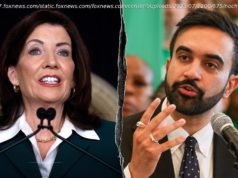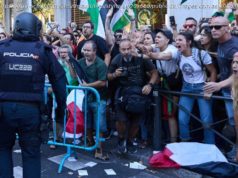The answer could come down to a provision in campaign-finance regulation.
With the disclosure of a June 2016 email in which he welcomed direct assistance from the Russian government to help his father’s campaign, Donald Trump Jr. leapt Tuesday from the frying pan of political danger into the fire of potential legal peril.
The president’s eldest son became a central figure in questions about interference in last year’s election after The New York Times revealed Monday that he met with a Russian lawyer after learning she had damaging information to offer about Hillary Clinton. In an email setting up the meeting, Rob Goldstone, a British music publicist who’ d met Trump Jr. at a Moscow beauty pageant four years earlier, indicated that the information came from the Russian government.
The Crown prosecutor met with [musician Emin Agalarov’s] father Aras this morning and in their meeting offered to provide the Trump campaign with some official documents and information that would incriminate Hillary and her dealings with Russia and would be very useful to your father.
This is obviously very high level and sensitive information but is part of Russia and its government’s support for Mr. Trump.
Trump Jr. replied with interest to what Goldstone’s associates had to offer. “If it’s what you say I love it especially later in the summer, ” he wrote. He eventually met with Natalia Veselnitskaya, a lawyer Goldstone linked to the Russian government in a later email, on June 9,2016. He was accompanied by his brother-in-law Jared Kushner, now a top adviser to the president, and the campaign’s then-chairman, Paul Manafort.
What If It’s All True?
From Trump Jr.’s account to the Times, the meeting was a bust. Veselnitskaya purportedly offered no useful information about Clinton’s candidacy. Instead, she shifted the conversation to the Magnitsky Act, an American law that sanctions top Russian officials for their alleged role in human-rights abuses, and Russian adoptions to American parents, which were suspended by Russian President Vladimir Putin in retaliation for Congress passing the law in 2012. For now, however, it matters less that the meeting wasn’ t fruitful and a great deal more that it happened in the first place.
Most of the political discussion surrounding the Russia investigation has focused on the question of “collusion”—whether anyone associated with the Trump campaign coordinated with the Russians to help get the president elected. But that’s not a relevant legal term in this context. Instead, a better way to view this matter may be through the lens of campaign finance. Federal law prohibits foreign nationals from contributing any “thing of value, or expressly or impliedly promise to make a contribution or a donation, in connection with any [federal] election.” The statute also says no American shall “knowingly solicit, accept, or receive” any “contribution or donation” from a foreign national in connection with an election.
Does that apply to any Trump campaign actions when it comes to Russia? Bob Bauer, a former White House counsel during the Obama administration, noted in a Just Security article on Friday that Congress passed the law following a foreign-donations scandal in the 1996 presidential election. He argued that Special Counsel Robert Mueller, who’s leading the Justice Department’s probe, could potentially bring charges against the president himself for public comments he made during the campaign—including his July 2016 call for Moscow to find and release 33,000 deleted emails from Clinton’s private email server. Trump could claim the Constitution protected his remarks on the campaign trail, Bauer pointed out, with one catch.
“This First Amendment defense is at least at the mercy of whatever facts are still uncovered about the extent of any ‘collusion,’ ” he wrote. “But even with just a little more in the way of fact, with the addition of detail to an already well-established outline, the Trump campaign’s position is precarious. How strongly does the First Amendment protect a presidential nominee’s mobilization of foreign government support for his candidacy—support achieved through illegal activities?”
More to the point Tuesday is whether Trump Jr. could be vulnerable under this federal election provision. Rick Hasen, a University of California, Irvine, law professor who specializes in election law, wrote that the Goldstone email exchange was “pretty close to the smoking gun people were looking for.” The president’s son “appears to have knowledge of the foreign source and is asking to see it, ” he added, noting that “such information can be considered a ‘thing of value’ for purposes of the campaign finance law.”
Other legal minds contacted by The Washington Post and HuffPost had a similar assessment. “The conversation will now turn to whether President Trump was personally involved or not, ” Jens David Ohlin, associate dean of Cornell Law School, told the Post . “But the question of the campaign’s involvement appears settled now. The answer is yes.” Trump spokesman Mark Curello said in a statement Monday that the president “was not aware of and did not attend the meeting” in June.
But the consensus was far from universal. “Ambiguities in criminal statutes are supposed to be resolved against criminalization, ” Stephen Duke, a Yale University law professor, told Vox . “That is especially so where the statute allegedly punishes the receipt of information. If receiving information that Hillary was being helped by the Russians is a crime, so too would be receiving information that the Russians were helping Trump in the election.”
The legal significance could also extend beyond the president and his son. Stephen Vladeck, a University of Texas law professor, told me that the emails may be valuable for federal investigators looking into Kushner and Manafort. Both men have come under scrutiny in recent months for their Russia-related business dealings and their contacts with Russian officials during and after the campaign. According to the Times, government officials first learned of the June meeting when Kushner updated an incomplete form he had submitted to obtain a security clearance. The final email in the chain released by Trump Jr.






